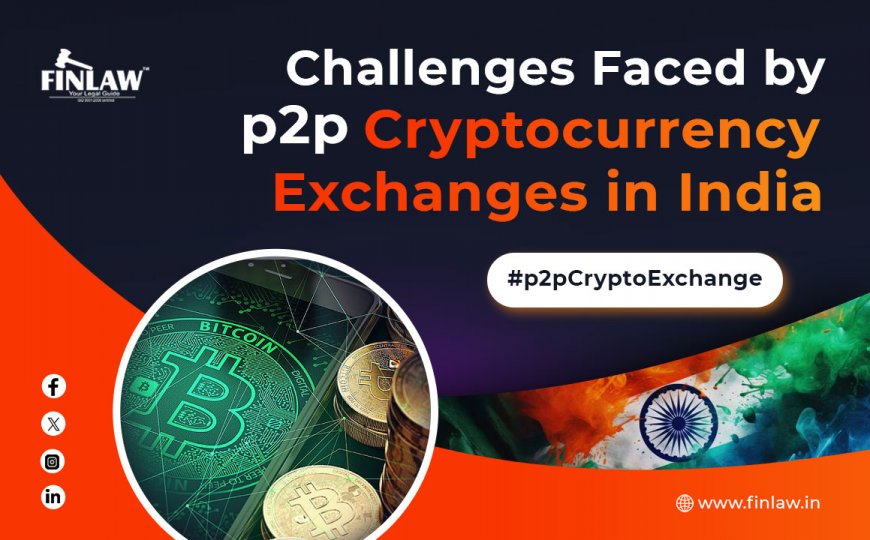Challenges Faced by P2P Cryptocurrency Exchanges in India
Discover the challenges faced by P2P cryptocurrency exchanges in India, including technological, regulatory, and market issues. Read the full article.

Peer-to-peer (P2P) cryptocurrency exchanges have become popular as decentralized alternatives to established exchanges. Users can trade directly with one another using these platforms, eliminating the need for a middleman. While this strategy has advantages such as more privacy and lower expenses, it also faces numerous distinct obstacles, notably in India.
Challenges for P2P Cryptocurrency Exchanges in India
-
Technological Challenges
-
Scalability: P2P exchanges sometimes suffer from scaling. As the number of users grows, maintaining a smooth and fast transaction process becomes more challenging without a strong infrastructure.
-
Security: The security of transactions and user data is critical. P2P exchanges are frequently targeted for hacking, phishing, and other cyber assaults.
-
User Experience: Designing an intuitive and user-friendly interface is difficult. Many consumers are not technologically knowledgeable, and cumbersome processes may prevent them from utilizing the site.
-
Liquidity Management: Ensuring sufficient liquidity to enable seamless transactions is a major technological challenge. Low liquidity can cause price volatility and negative user experiences.
-
Regulatory Challenges
-
Unclear Regulations: The regulatory framework for cryptocurrencies in India is uncertain. The lack of clear norms causes ambiguity in P2P crypto exchanges in India.
-
Compliance Requirements: Adhering to anti-money laundering (AML) and know-your-customer (KYC) regulations are required yet difficult. Ensuring complete and precise compliance increases operational difficulties.
-
Banking Limitations: Periodic banking prohibitions and limitations make it impossible for peer-to-peer exchanges to connect regular banking services, preventing seamless transfers between fiat and cryptocurrency.
-
Legal Risks: Due to the ever-changing legal environment, P2P exchanges are continuously vulnerable to new restrictions or prohibitions, which have an influence on their operations and user confidence.
-
Market Challenges
-
Competition: The market is packed with P2P exchanges, each competing for a small user base. Differentiating from rivals is a major problem.
-
Market volatility: Cryptocurrency prices are extremely volatile. This volatility may dissuade risk-averse individuals, affecting the exchange's user acquisition and retention.
-
User Trust: Establishing and retaining trust is critical. Given previous episodes of fraud and exchange failures, convincing consumers of a P2P platform's safety and dependability remains a difficulty.
-
Awareness and Education: Many potential consumers lack a basic grasp of cryptocurrency and peer-to-peer trading. Market education is critical, but it requires significant resources.
User Experiences and Common Complaints About P2P Cryptocurrency Exchanges in India
While P2P crypto exchanges in India provide a decentralized and private alternative to established trading platforms, user experiences can differ significantly. Users of these exchanges have expressed many common problems and concerns. Understanding these concerns is critical for platforms to improve services and increase customer happiness.
-
Technical Issues
-
-
Slow transaction speeds: Many customers notice poor transaction rates, especially during moments of strong trading activity. Delays may be annoying, especially for traders who want to capitalize on market opportunities as soon as possible.
-
Platform Downtime: Unexpected outages or maintenance periods might interrupt trading and cause annoyance. Users anticipate uninterrupted access to the site, and any disruptions might cause frustration.
-
Complex User Interface: Many users find P2P cryptocurrency exchanges difficult to navigate. Complicated processes and a lack of obvious design might turn off new users and frustrate expert traders.
-
Mobile App Performance: Many customers like to trade while on the go, therefore mobile app speed is crucial. Complaints frequently center on app failures, sluggish loading times, and restricted functionality compared to desktop versions.
-
-
Security Concerns
-
-
Fear of Hackers and Scammers: Security is a primary priority for users. Reports of hacking, phishing attacks, and frauds generate a sense of uneasiness. Users demand strong security measures to secure their money and personal information.
-
Trust issues with counterparties: P2P exchanges require direct transactions between users, which might lead to trust difficulties. Some users meet fraudulent counterparties, raising worries about the safety of their transactions.
-
-
Regulatory and Compliance Issues
-
-
KYC/AML Verification Delays: The verification of user identification (KYC) and compliance with anti-money laundering (AML) laws can be time-consuming. Users frequently complain about verification delays, which limit their ability to begin trading quickly.
-
Banking and Withdrawal Problems: Users commonly encounter difficulty while withdrawing monies from their bank accounts. Common concerns include banking limits and withdrawal processing delays, which cause annoyance and financial trouble.
-
-
Market-related issues
-
-
Price Volatility and Slippage: Price volatility in the cryptocurrency market can cause slippage, which occurs when a trade's execution price departs from the expected price. Users frequently complain about considerable slippage, which might damage their trading results.
-
Liquidity Issues: Low liquidity on some P2P exchanges can result in huge bid-ask spreads, making it difficult to complete deals at the required price. Users demand enough liquidity to provide a seamless trading experience.
-
-
Customer Support Challenges
-
-
Inadequate Customer Service: Users routinely voice their unhappiness with customer help. Common concerns include delayed response times, inappropriate replies, and difficulty resolving issues. Effective and timely customer service is crucial to user happiness.
-
Lack of Transparency: Transparency in operations, fee structures, and conflict resolution systems is critical to establishing user confidence. Users frequently complain about hidden fees, imprecise regulations, and opaque dispute resolution methods.
-
-
Education and Awareness Gaps
-
-
Lack of Educational Resources: Many users, particularly newbies, struggle to comprehend the complexity of bitcoin trading and the precise mechanics of peer-to-peer exchanges. A lack of comprehensive teaching tools might jeopardize their trading knowledge and confidence.
-
Misinformation and Rumors: The digital currency sector is full of disinformation and myths. Users can be swayed by false information, resulting in bad trading decisions and overall distrust of the site.
-
Lack of Awareness and Efforts Required to Build Trust and Credibility in the P2P Cryptocurrency Exchange Market in India
-
Lack of Awareness
-
Limited Understanding of Cryptocurrencies: Many potential consumers in India have an inadequate grasp of cryptocurrencies and how P2P exchanges work. This lack of information can lead to misunderstandings and a reluctance to interact with these sites. Users may be uninformed of the advantages, hazards, and operational intricacies of peer-to-peer trades, reducing adoption.
-
Complexity of Technology: Cryptocurrency trading, especially on peer-to-peer networks, may be technically sophisticated. The ordinary user may find the process of creating a wallet, safeguarding private keys, and comprehending market dynamics onerous. This intricacy serves as a barrier to entry for many potential consumers.
-
Insufficient Educational Resources: Educational materials on P2P exchanges and the crypto ecosystem are limited in scope and accessibility. This scarcity of educational resources leads to the general public's lack of knowledge and comprehension.
-
Efforts Required to Build Trust and Credibility
-
Transparency and Communication: Transparency and communication are crucial for building confidence in P2P trades. This includes a clear explanation of how the platform operates, the security measures in place, and the associated expenses. Regular updates and open avenues for user input can promote transparency.
-
Robust Security Measures: Users prioritize robust security measures. P2P exchanges must adopt and explicitly convey strong security mechanisms including end-to-end encryption, two-factor authentication, and regular security audits. Building confidence requires demonstrating a strong commitment to the protection of customer data and finances.
-
User Education and Support: Investing in user education is critical. P2P exchanges should create and disseminate instructional content, like as tutorials, webinars, and frequently asked questions, to assist users in comprehending the platform and the larger crypto market. Providing timely and helpful customer service may boost consumer confidence and happiness.
-
Compliance and Regulations: Adherence to regulatory regulations and conformity with local laws may considerably boost trustworthiness. P2P exchanges should collaborate closely with authorities to ensure that they comply with all legal requirements. Displaying regulatory certificates and compliance badges on the platform might convince consumers about its validity.
-
Creating a Strong Community: Building a vibrant, active community around the P2P exchange can assist increase credibility. This may be accomplished through social media involvement, community forums, and event planning. A thriving community can give peer support and help the exchange gain a favorable reputation.
-
Reputation Management: Maintaining the platform's credibility is vital. P2P exchanges should respond to user complaints and difficulties in a timely and transparent manner. Encouraging pleased people to share their positive experiences and reviews may contribute to a favorable public image.
Possible Solutions and Improvements
To solve the issues that P2P cryptocurrency exchanges in India confront, a variety of solutions and enhancements are available. Enhancing user education with comprehensive materials such as tutorials, webinars, and user manuals can help to explain the complexity of bitcoin trading and P2P platforms. End-to-end encryption, two-factor authentication, and frequent security audits can help users feel more secure about their transactions and data.
Regulatory compliance is critical, thus P2P exchanges should work with regulators to ensure local laws are followed and compliance certifications are openly displayed. Improving user experience through intuitive interfaces and timely customer assistance may also increase trust and ease of use. Building a strong community through social media interaction, community forums, and events may help boost the platform's legitimacy and user support. Furthermore, open information regarding the platform's operations, pricing, and security measures can boost confidence and dependability. By concentrating on these aspects, P2P exchanges may build a more user-friendly, safe, and trustworthy environment, hence promoting greater use in India.
Addressing these challenges is crucial for the growth and success of P2P cryptocurrency exchanges in India. By enhancing user education, strengthening security, ensuring regulatory compliance, and fostering community trust, P2P exchanges can create a more reliable and user-friendly environment. These improvements will not only boost user confidence and adoption but also position P2P exchanges as a vital component of India's burgeoning cryptocurrency ecosystem, driving innovation and financial inclusion.
What's Your Reaction?



















